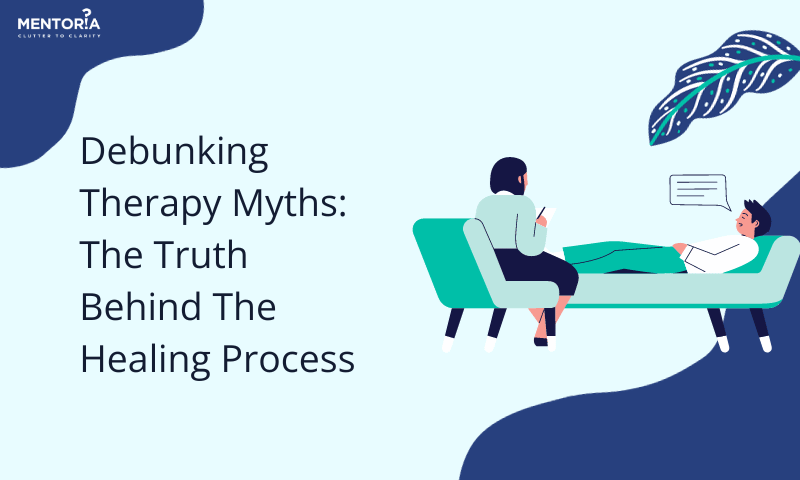Debunking Therapy Myths: The Truth Behind The Healing Process

Jump to Section
We’re about to debunk some common myths and misconceptions that often swirl around this transformative process. Therapy is not only for the “crazy” or “weak,” but for anyone seeking growth, self-discovery, and improved well-being. Therapy can be a life-changing experience, but it’s often shrouded in misunderstandings and stereotypes. It’s time to prioritise your mental and emotional well-being, and therapy can be the key to unlocking your fullest potential. Remember, seeking support is a sign of strength, and therapy is here to support and empower you on your path to a happier and healthier you.
Let’s dive in and explore the truth behind therapy, challenge those misconceptions, and discover how it can truly benefit your mental and emotional well-being. Get ready to bust some myths and embark on a journey of self-discovery and growth!
Myth #1: Therapy Is Only For “Weak” People
Let’s address the first myth head-on: therapy is not exclusively for individuals who are “weak.” This misconception stems from outdated stereotypes and stigmas surrounding mental health. In reality, therapy is for anyone who wants to improve their overall well-being. It’s an opportunity to gain self-awareness, develop coping skills, and navigate life’s challenges more effectively. Therapy is a brave choice, showing strength in seeking support and actively working on personal growth. According to a survey, approximately 1 in 5 adults in the United States experiences mental illness in a given year. However, only about 40% of those individuals seek treatment.
Myth #2: Therapy Is Just Talking About Your Problems
Contrary to popular belief, therapy is much more than just venting about your problems. While talking and sharing are important components, therapy involves a range of evidence-based techniques tailored to your specific needs. Therapists utilise various approaches such as cognitive-behavioural therapy, mindfulness practices, and solution-focused techniques to help you gain insights, challenge negative thought patterns, and develop healthier behaviours. Studies show that various therapeutic approaches, such as Cognitive-Behavioral Therapy (CBT) and Dialectical Behavior Therapy (DBT), have demonstrated effectiveness in treating a wide range of mental health issues.
Myth #3: Only “Extreme” Problems Require Therapy
Don’t fall for the myth that therapy is only for individuals with severe or “extreme” problems. Therapy can benefit anyone, regardless of the magnitude of their struggles. Whether you’re dealing with everyday stress, relationship difficulties, career transitions, or simply seeking personal growth, therapy offers a supportive and non-judgmental space to explore your thoughts, emotions, and experiences. Research indicates that therapy is beneficial for a broad spectrum of mental health concerns, including mild to moderate conditions like anxiety and depression.
Myth #4: Therapists Just Sit And Listen, Offering No Practical Solutions
Therapy is far from a passive experience where therapists simply sit and listen. They are skilled professionals who actively engage in the therapeutic process. Therapists provide guidance, offer practical strategies, and teach valuable coping skills to help you overcome challenges. They collaborate with you, tailoring the therapy to your unique needs and goals. Therapy is an interactive and dynamic process aimed at empowering you with the tools to navigate life’s complexities. Research suggests that therapy is effective in improving clients’ overall functioning and well-being, with positive outcomes reported by a significant percentage of therapy recipients.
Myth #5: Therapy Takes Years To Show Results
Contrary to popular belief, therapy doesn’t necessarily require years of commitment to yield positive results. The duration of therapy varies depending on individual circumstances, goals, and progress. Some individuals may experience significant improvements in a few months, while others may benefit from longer-term therapy. The focus is on your growth and well-being, and therapy can be tailored to suit your specific timeline and needs. Studies indicate that clients often experience significant improvements in their well-being within the first few sessions of therapy.
Myth #6: “Crazy” People Need Medication, Not Therapy
Dispelling another myth, therapy and medication are not mutually exclusive. While medication may be appropriate in some cases, therapy plays a vital role in mental health treatment. Therapists work collaboratively with medical professionals to provide holistic care. Therapy helps individuals understand the underlying factors contributing to their struggles, develop healthy coping mechanisms, and complement any medication treatment, if necessary. Research shows that combining medication with therapy can be more effective than medication alone in treating mental health conditions.
Shattering Therapy Myths With Mentoria!
You’ve just shattered some of the most common myths and misconceptions about therapy. Therapy is a collaborative journey of self-exploration, guidance, and practical solutions. So, if you’ve been hesitating to take the plunge, let go of those misconceptions and embrace the transformative power of therapy.
We’re here to provide you with all the help! Kick-start your journey with Mentoria and discover the right fit for you. Feel free to call us to speak to our career mentors and choose the right guidance plan that suits your needs.
Mentoria’s career guidance programme enables you to choose your perfect fit from 3 streams, 850+ courses, and 12,000+ careers, and discover what will bring out the best in you.









